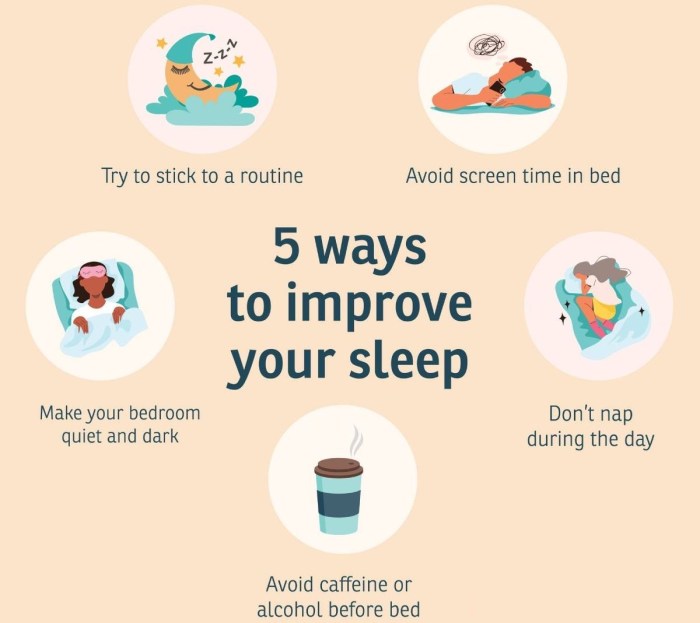Embark on a journey to better sleep with How to Improve Your Sleep Quality in 10 Simple Tips, where we delve into effective strategies for enhancing your nightly rest. Discover the key elements that contribute to a restful slumber and wake up feeling refreshed each day.
Explore the correlation between sleep quality and overall well-being, and uncover practical tips to transform your sleep environment for optimal relaxation. Dive into the world of healthy habits that can significantly impact the quality of your sleep and improve your daily productivity.
Importance of Sleep Quality

Poor sleep quality can have a significant impact on physical health, leading to a weakened immune system, weight gain, and increased risk of chronic conditions such as heart disease and diabetes. Inadequate sleep has also been linked to a higher likelihood of accidents and injuries due to impaired cognitive function and slower reaction times.
Connection Between Sleep Quality and Mental Well-being
Improving sleep quality is crucial for maintaining mental well-being. Sleep deprivation can contribute to mood disorders, anxiety, and depression. Quality sleep plays a vital role in regulating emotions, processing information, and overall cognitive function. By prioritizing good sleep habits, individuals can better manage stress and improve their mental health.
Enhancing Productivity During the Day
Quality sleep is essential for optimal daytime performance and productivity. A well-rested body and mind are better equipped to focus, problem-solve, and make decisions efficiently. By ensuring a good night’s sleep, individuals can experience increased energy levels, enhanced concentration, and improved memory retention, ultimately leading to higher productivity levels throughout the day.
Tips for Creating a Sleep-Inducing Environment

Creating the right environment in your bedroom can significantly impact the quality of your sleep. Factors like lighting, temperature, noise levels, and distractions play a crucial role in promoting restful sleep.
Optimizing Lighting and Temperature
- Keep your bedroom dark and cool to signal to your body that it’s time to sleep. Consider using blackout curtains or an eye mask to block out any unwanted light.
- Ensure your room is at a comfortable temperature, typically between 60-67°F (15-19°C), as cooler temperatures are generally more conducive to sleep.
- Avoid exposure to bright screens (phones, tablets, computers) before bed, as the blue light can disrupt your body’s natural sleep-wake cycle.
Minimizing Noise and Distractions
- Use earplugs or a white noise machine to drown out any disruptive sounds that may disturb your sleep.
- Remove electronics, work materials, or any other distractions from your bedroom to create a peaceful and relaxing sleep environment.
- Consider using aromatherapy with calming scents like lavender to help you relax and unwind before bedtime.
Healthy Habits for Improved Sleep

Establishing healthy habits is essential for improving sleep quality. Consistency in your daily routine can have a significant impact on the quality of your sleep. Here are some key habits to incorporate into your lifestyle:
Consistent Sleep Schedule
Maintaining a regular sleep schedule can help regulate your body’s internal clock, making it easier to fall asleep and wake up at the same time every day. This consistency reinforces your body’s natural sleep-wake cycle, promoting better overall sleep quality. Try to go to bed and wake up at the same time each day, even on weekends.
Avoiding Stimulants
Stimulants like caffeine can interfere with your ability to fall asleep and stay asleep. It is important to avoid consuming caffeine close to bedtime, as it can disrupt your sleep cycle. Limit your caffeine intake to earlier in the day and opt for calming herbal teas or warm milk before bed.
Regular Exercise
Engaging in regular physical activity can improve the quality of your sleep. Exercise helps reduce stress and anxiety, which are common factors that can disrupt sleep. Aim for at least 30 minutes of moderate exercise most days of the week, but avoid vigorous workouts close to bedtime as they may have the opposite effect and energize you instead of promoting relaxation.
Final Wrap-Up

As we conclude our discussion on How to Improve Your Sleep Quality in 10 Simple Tips, remember that a good night’s sleep is not just a luxury but a necessity for a healthy and fulfilling life. By implementing these tips, you can take charge of your sleep routine and experience the benefits of enhanced rest and rejuvenation. Sweet dreams await!